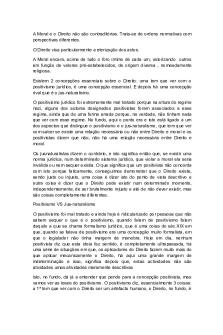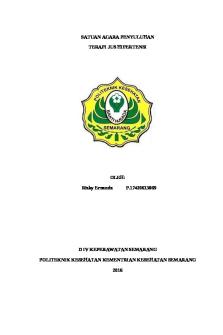UBI JUS IBI Remedium-Locke-Govt PDF

| Title | UBI JUS IBI Remedium-Locke-Govt |
|---|---|
| Course | Tort law |
| Institution | University of London |
| Pages | 2 |
| File Size | 75.6 KB |
| File Type | |
| Total Downloads | 98 |
| Total Views | 180 |
Summary
Download UBI JUS IBI Remedium-Locke-Govt PDF
Description
UBI JUS IBI REMEDIUM It is a Latin Maxim which has literal meaning that “Where there is right, there is remedy “. We can also express it as “every wrong has a legal remedy available “and if any legal right is infringed, it always has a legal remedy to enforce the infringed right through court of law. The law of torts is said to be a development of the maxim ‘ubi jus ibi remedium’. If a man has a right, “he must of necessity have a means to vindicate and maintain it and a remedy if injured in the exercise or enjoyment of it. The maxim does not mean, there’s a legal remedy for every moral or political wrong. There are many moral and political wrongs which are not recognized by law and are therefore not actionable. So, the maxim does not say that there is legal remedy for every wrong. Justice Stephen of England has rightly remarked that the maxim would be more intelligibly and correctly stated if it were to be reversed to say that where there is no legal remedy, there is no legal wrong.
JOHN LOCKE’S CONCEPT OF GOVERNEMNT John Locke compiled “Two Treatise of Government “when he was living an exiled life in Holland. This was his excellent piece of work in the arena of political science. He propounded in his Second treatise that man was born free and has inherent powers of enjoy his life. He has liberty to do whatever he wants but within the boundaries of law of nature. A man has many rights within a society but these rights can only be enjoyed if not in clash with others rights. Law of nature, according to Locke, has a binding on all citizens of the society to fulfil obligations/duties imposed by the state. In order to protect, rights of each other, citizens of a state contract amongst themselves and form a body of representatives called “Government “having sufficient powers to enforce law in a state. The Government is vested powers by the individuals
TORT LAW
JAMIL AHMED
at large through a “Social Contract “by sacrificing their rights in individual capacity. This “Social Contract “is entrustment of certain responsibilities to the Government by individuals to act as their guardian of rights. John Lock also profoundly advocates the separation of state pillars. He articulated that legislature may, with the agreement of the majority, impose such taxes as are required to fulfill the ends of the state—including, of course, its defense. If the executive power fails to provide the conditions under which the people can enjoy their rights, then the people are entitled to remove through revolt.
TORT LAW
JAMIL AHMED...
Similar Free PDFs

UBI JUS IBI Remedium-Locke-Govt
- 2 Pages

IBI - Esquema IBI
- 1 Pages

Makalah Budidaya Ubi jalar-
- 1 Pages

Positivismo VS jus naturalismo
- 3 Pages

JUS 101 Final Project
- 12 Pages

SAP terapi jus hipertensi
- 14 Pages

JUS 455 Additional Readings
- 4 Pages

Relativi Espressioni Interi Ubi Math
- 15 Pages

Proposal Usaha Keripik Ubi Cilembu
- 12 Pages

JUS-212 Rational choice
- 3 Pages
Popular Institutions
- Tinajero National High School - Annex
- Politeknik Caltex Riau
- Yokohama City University
- SGT University
- University of Al-Qadisiyah
- Divine Word College of Vigan
- Techniek College Rotterdam
- Universidade de Santiago
- Universiti Teknologi MARA Cawangan Johor Kampus Pasir Gudang
- Poltekkes Kemenkes Yogyakarta
- Baguio City National High School
- Colegio san marcos
- preparatoria uno
- Centro de Bachillerato Tecnológico Industrial y de Servicios No. 107
- Dalian Maritime University
- Quang Trung Secondary School
- Colegio Tecnológico en Informática
- Corporación Regional de Educación Superior
- Grupo CEDVA
- Dar Al Uloom University
- Centro de Estudios Preuniversitarios de la Universidad Nacional de Ingeniería
- 上智大学
- Aakash International School, Nuna Majara
- San Felipe Neri Catholic School
- Kang Chiao International School - New Taipei City
- Misamis Occidental National High School
- Institución Educativa Escuela Normal Juan Ladrilleros
- Kolehiyo ng Pantukan
- Batanes State College
- Instituto Continental
- Sekolah Menengah Kejuruan Kesehatan Kaltara (Tarakan)
- Colegio de La Inmaculada Concepcion - Cebu





